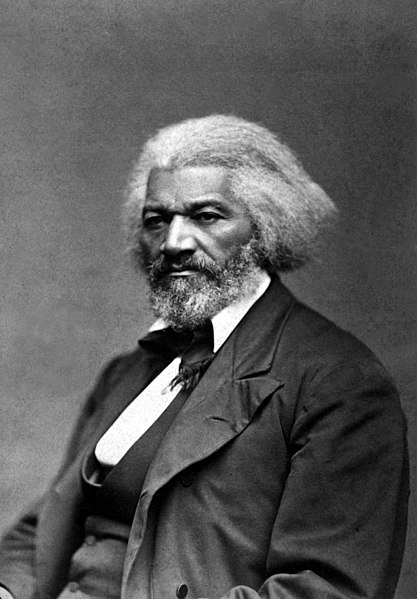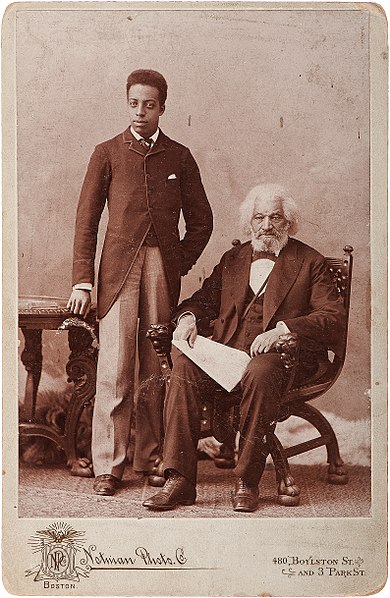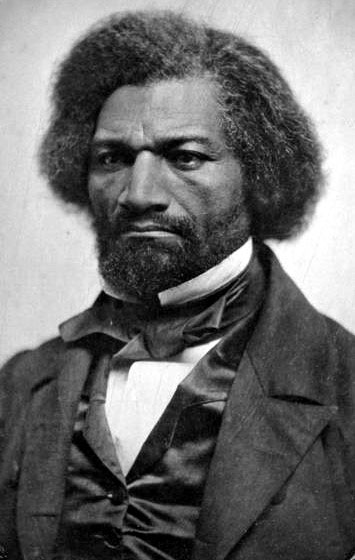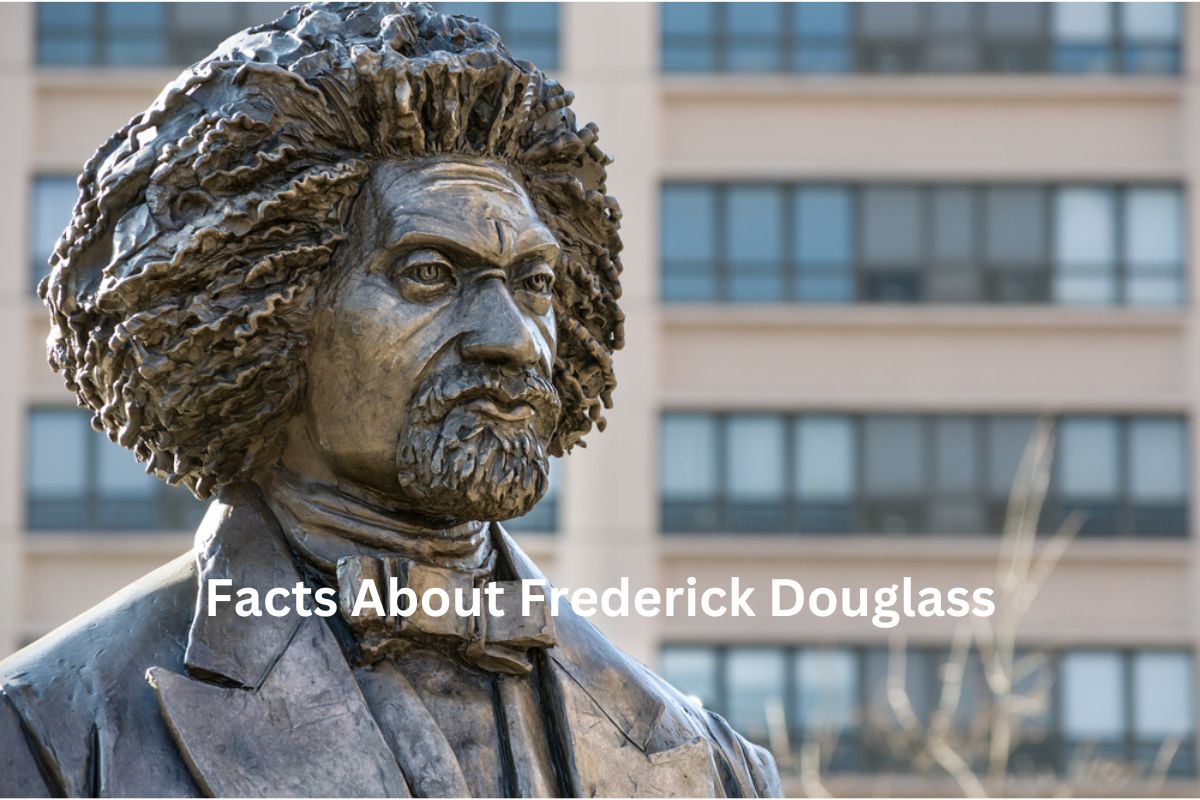Frederick Douglass (c. 1818–1895) was a prominent African American abolitionist, writer, and orator. Born into slavery in Maryland, Douglass managed to escape to the North and became a leading advocate for the rights of enslaved African Americans.
His powerful autobiographical works, such as “Narrative of the Life of Frederick Douglass,” exposed the brutalities of slavery and played a significant role in shaping public opinion.
Douglass was also an ardent supporter of women’s rights, working alongside suffragists like Susan B. Anthony and Elizabeth Cady Stanton.
Throughout his life, Douglass fearlessly spoke out against racism, inequality, and injustice. His legacy as a champion of freedom, equality, and justice continues to inspire and influence the ongoing struggle for civil rights.
Frederick Douglass Facts
1. Frederick Douglass was born around February 1818 in Talbot County, Maryland
Born into slavery, the precise date of Frederick Douglass’s birth remains uncertain. As was common for enslaved individuals, birth records were often not kept. Douglass himself was uncertain about the exact year, but he celebrated his birthday on February 14.
Also Read: Frederick Douglass Accomplishments
This date became symbolic to him, representing his mother’s affectionate words to him during his childhood. The lack of certainty surrounding his birth-date highlights the dehumanizing nature of slavery, where personal histories and identities were often disregarded.

2. Born into slavery, Frederick Douglass’s birth name was Frederick Augustus Washington Bailey
Douglass was given the name Frederick Augustus Washington Bailey by his mother, Harriet Bailey. The name “Bailey” was derived from his mother’s slave owner.
However, after successfully escaping from slavery, he decided to change his name to Frederick Douglass, signifying his freedom and independence.
The exact reasons behind the choice of the surname “Douglass” remain unclear, but it is believed that he selected it in honor of a character in Sir Walter Scott’s poem “The Lady of the Lake.”
3. Douglass taught himself to read and write, despite laws prohibiting the education of enslaved people
Douglass’s desire for knowledge and education was fueled by his early exposure to reading and writing. As a young boy, he observed the white children in his community learning to read and write.
Recognizing the power of literacy, he made efforts to befriend these children and learn from them. They would often share their lessons, providing him with an opportunity to acquire basic reading skills.
Also Read: Frederick Douglass Timeline
Douglass’s journey towards literacy intensified when he was sent to Baltimore to work for a new slaveholder. There, he encountered Sophia Auld, the wife of his new master, who initially taught him the alphabet and some words. However, when her husband, Hugh Auld, discovered her actions, he strictly forbade her from educating Douglass.
This prohibition only fueled Douglass’s determination to learn, and he took it upon himself to further his education secretly. He would exchange bread with poor white children in the street for reading lessons, and he learned to write by copying the letters in shipyard markings.

4. In 1838, at the age of 20, Douglass successfully escaped slavery by disguising himself as a sailor
Frederick Douglass’s escape from slavery was a daring and carefully planned endeavor. After enduring years of physical and mental abuse as a slave, he decided to escape to the North, where slavery was abolished.
In September 1838, Douglass disguised himself as a sailor, wearing borrowed clothes and carrying identification papers obtained from a free African American sailor. With his new persona, he boarded a train in Baltimore, Maryland, and traveled through several states until he reached New York City.
From there, he continued to New Bedford, Massachusetts, where he settled and began his life as a free man.
5. Douglass became a prominent abolitionist, speaker, and writer, advocating for the rights of enslaved African Americans
Once settled in New Bedford, Douglass became involved in the abolitionist movement. He attended anti-slavery meetings and was inspired to share his own experiences as a slave to raise awareness about the atrocities of slavery.
His eloquence and powerful storytelling abilities made him a sought-after speaker. Douglass delivered numerous speeches, captivating audiences with his firsthand accounts of the brutality and dehumanization endured by enslaved individuals.
In 1845, Douglass published his first autobiography, “Narrative of the Life of Frederick Douglass, an American Slave.” The book gained widespread attention and became a bestseller.
By recounting his experiences and exposing the cruelty of slavery, Douglass aimed to humanize enslaved people and challenge the prevailing racist narratives of the time.
He went on to write two more autobiographies, “My Bondage and My Freedom” in 1855 and “Life and Times of Frederick Douglass” in 1881, further documenting his life and advocacy for equality.
6. Douglass became the first African American to be nominated for Vice President of the United States
In 1872, Frederick Douglass made history as the first African American to be nominated for the position of Vice President of the United States. He was nominated by the Equal Rights Party, which was a political party advocating for women’s suffrage and equal rights for all.
Douglass ran as the running mate of Victoria Woodhull, who was the first female candidate for President of the United States. Although their ticket did not win the election, their nomination was a significant milestone in the ongoing struggle for equality and representation.

7. He was a firm believer in women’s rights and worked closely with prominent suffragists
Frederick Douglass was an ardent supporter of women’s rights and gender equality. He recognized the intersectionality of different forms of oppression and understood that the fight for women’s rights was intricately linked to the fight against racial inequality.
Douglass worked closely with leading suffragists of the time, including Susan B. Anthony and Elizabeth Cady Stanton, forming alliances to advance the cause of women’s suffrage.
Douglass actively participated in women’s rights conventions, delivering powerful speeches that called for the recognition of women’s inherent rights and their inclusion in the political process. He advocated for the right of women to vote and stressed the importance of gender equality in creating a just society.
8. Douglass held various government positions, including U.S. Marshal and Minister to Haiti
After the American Civil War and the abolition of slavery, Frederick Douglass continued his involvement in politics.
In 1877, President Rutherford B. Hayes appointed Douglass as the United States Marshal for the District of Columbia, making him the first African American to hold that position. As U.S. Marshal, he was responsible for enforcing federal laws and maintaining order in the nation’s capital.
In 1889, President Benjamin Harrison appointed Douglass as Minister to Haiti, a diplomatic position representing the United States in the Caribbean nation.
Also Read: Timeline of the Haitian Revolution
As Minister, Douglass worked to strengthen diplomatic relations between the two countries and advocated for the rights of Haitian citizens. His appointment as Minister to Haiti demonstrated the recognition of his skills, intellect, and influence on the international stage.
9. Despite facing threats and physical attacks, Douglass tirelessly spoke out against racism
Frederick Douglass was a vocal and fearless advocate for civil rights, consistently challenging the deeply entrenched racism and inequality of his time. His powerful speeches and writings condemned slavery, racism, and discrimination, making him a target for those who opposed his message.
Throughout his life, Douglass faced numerous threats and physical attacks. His speeches often provoked hostility from white supremacists and opponents of abolition. Despite these dangers, Douglass remained resolute in his mission, believing that speaking out against injustice was crucial for societal progress.
10. In 1845, Douglass published his autobiography, which became a bestseller
Frederick Douglass’s autobiographical works played a vital role in exposing the horrors of slavery and shaping public opinion. His first autobiography, “Narrative of the Life of Frederick Douglass, an American Slave,” published in 1845, was an instant success and became a bestseller.
The book provided a detailed account of his experiences as an enslaved person and helped humanize the institution of slavery for readers.
Douglass followed up with two more autobiographies: “My Bondage and My Freedom” in 1855 and “Life and Times of Frederick Douglass” in 1881. These subsequent works delved deeper into his personal journey, his escape from slavery, and his ongoing advocacy for freedom and equality.
Douglass’s autobiographies not only provided a historical record but also served as powerful tools for inspiring and educating generations about the realities of slavery and the importance of fighting against oppression.
11. Douglass was a skilled orator and delivered powerful speeches
Frederick Douglass’s oratory skills were legendary, and he was renowned for his ability to captivate audiences with his eloquence and passionate delivery.
One of his most notable speeches was “What to the Slave Is the Fourth of July?”, delivered on July 5, 1852, in Rochester, New York.
In this speech, Douglass confronted the hypocrisy of celebrating freedom and independence while millions of enslaved individuals remained in bondage. He forcefully criticized the institution of slavery and the complicity of the nation in perpetuating this injustice.
The speech remains a powerful indictment of systemic racism and continues to resonate as a call for justice and equality.
12. After the American Civil War, Douglass advocated for the rights of newly freed slaves
Following the end of the American Civil War and the abolition of slavery with the Emancipation Proclamation, Frederick Douglass continued his tireless advocacy for the rights of African Americans.
He recognized that the formal abolition of slavery was only the beginning and that significant legal and constitutional reforms were necessary to secure the rights and liberties of newly freed slaves.
Douglass actively campaigned for the passage of the Thirteenth Amendment, which officially abolished slavery and involuntary servitude.
He also played a pivotal role in advocating for the ratification of the Fourteenth Amendment, which granted citizenship and equal protection under the law to all individuals born or naturalized in the United States, regardless of race.
Additionally, Douglass fought for the ratification of the Fifteenth Amendment, which guaranteed the right to vote regardless of race or color.
13. Frederick Douglass passed away on February 20, 1895, at his home in Washington, D.C
Frederick Douglass’s lifelong dedication to the cause of freedom, equality, and justice left an indelible impact on American history and the fight against racial inequality. He passed away on February 20, 1895, at the age of 77, at his home in Anacostia, Washington, D.C.
Douglass’s legacy lives on as a towering figure in the abolitionist movement and the fight for civil rights. His relentless pursuit of justice, his powerful oratory and writings, and his unwavering commitment to freedom continue to inspire and educate people around the world.
Frederick Douglass’s courage and advocacy paved the way for future civil rights leaders and activists, and his ideas and principles remain relevant in ongoing efforts to combat systemic racism and promote equality.
